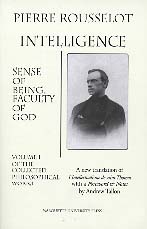16. Intelligence: Sense of Being, Faculty of God, by Pierre Rousselot, S.J. A New Translation of L’Intellectualisme de saint Thomas with a Foreword and Notes by Andrew Tallon. Volume 1 of Rousselot’s Collected Philosophical Works. ISBN 0-87462-615-3. ©1999. Paperbound. New Index. Bibliography. 240 pp. $30
“By intellectualism I understand a doctrine that places everything of worth, all of life’s intensity, and the very essence of the good, identical with being, in the act of intelligence: everything else can be good only by participation in it. When in current usage we hear talk of intellectualism people often mean only a naive confidence in intelligence and particularly in deductive reasoning. A more technical meaning, one that tends to prevail over the popular one, characterizes intellectualism by the primacy of static definitions and discursive reason. The essentially metaphysical doctrine in question here is quite different: beyond the theory that all being is capable of being explained, it is the complete opposite of a system that would conceive the life of the spirit on the model of human discursive reasoning. Accordingly, to the extent that the usual meaning of the term is developed and pushed to its ultimate consequences, the meaning here adopted would cease to coincide with it, and would end up diametrically opposed to it.“ — From the author’s Introduction
With these words Pierre Rousselot, the first and most original genius of what has come to be called “transcendental Thomism,” took on the rationalism of his day and proceeded to prove beyond doubt that the “intellectualism” of Thomas Aquinas was a completely different philosophy. In an emerging departure from the faculty psychology dominant in his day, he showed that Aquinas’s ratio meant a lower performance of intelligence-his preferred translation of intellectus, and that intellectus named the fullness of intelligent life enjoyed by the angels and God, in which we participate as the lowest in this hierarchy of intelligences. Reason is not the best we can do, because it is but the first of a series of substitutes we use for intelligence, which is a synthesis of cognition and affection in the service of action, a synthesis experienced in connaturality, a much neglected but central Thomist concept that Rousselot retrieved, practically single-handedly, in a masterly study of the complete Thomist corpus.
This new translation, with an extensive Foreword and notes by the translator, renders Rousselot’s text with greater accuracy than its predecessor. It inaugurates a new series of 4 volumes of Rousselot’s philosophical works. His work on love is next, followed by his published essays, and the series concludes with his unpublished notes, journals, and other papers, to be edited from the Jesuit Archives of France.






